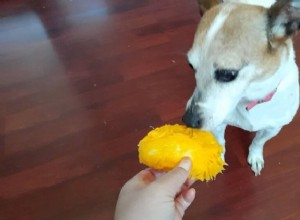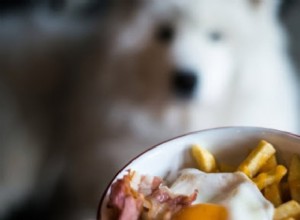
 Můžou kočky pít mléko? Zde je vše, co potřebujete vědět
Můžou kočky pít mléko? Zde je vše, co potřebujete vědět
 Můžou psi jíst česnek? Zde je vše, co potřebujete vědět
Můžou psi jíst česnek? Zde je vše, co potřebujete vědět
 Můžou psi jíst tuňáka? Zde je vše, co potřebujete vědět
Můžou psi jíst tuňáka? Zde je vše, co potřebujete vědět
 Můžou psi jíst kokos? Zde je vše, co potřebujete vědět
Můžou psi jíst kokos? Zde je vše, co potřebujete vědět
 Můžou psi pít mléko? Zde je vše, co potřebujete vědět
Můžou psi pít mléko? Zde je vše, co potřebujete vědět
 Můžou psi jíst špenát? Zde je vše, co potřebujete vědět
Můžou psi jíst špenát? Zde je vše, co potřebujete vědět
 Můžou psi jíst vlašské ořechy? Zde je vše, co potřebujete vědět
Můžou psi jíst vlašské ořechy? Zde je vše, co potřebujete vědět
 Můžou psi jíst skořici? Zde je vše, co potřebujete vědět
Můžou psi jíst skořici? Zde je vše, co potřebujete vědět
Nápoj může být pro lidi plný výhod, ale mohou psi pít mléko - nebo je mléko pro psy špatné? Nakonec záleží na trávicím systému psa, takže odpověď se mění případ od případu. Je nepravděpodobné, že by pití malého množství bylo pro domácí mazlíčky toxické, ale nikdy by se nemělo konzumovat ve velkém množství a někteří psi by se mu měli vyhýbat úplně.
Vše závisí na laktóze – přírodním cukru, který se nachází v mléce – a na schopnosti vašeho štěněte jej strávit. Čtěte dále a dozvíte se, jak zjistit, zda váš pes trpí intolerancí laktózy, jaké množství mléka je bezpečné pro psy se silným žaludkem a další podrobnosti o přítomnosti mléčných výrobků ve stravě psů.
Obsah:
Tip pro profesionály: Plán pojištění zvířat může pokrýt náklady na testování a léčbu alergií a navíc vám pomůže dovolit si veterinární péči pro mnoho dalších nemocí a zranění, na které se vztahuje vaše pojistka.
Mnoho psů může bezpečně konzumovat mléko v malých množstvích, ale jiní nesnášejí laktózu , což znamená, že jejich trávicí systém neprodukuje dostatečné množství enzymu zvaného laktáza která má za úkol rozložit cukr v mléce neboli laktózu .
Podle VCA Animal Hospitals jsou mléčné výrobky primárním zdrojem nežádoucích reakcí na krmivo psů. Závažnost každé reakce závisí na tom, jak dobře dokáže trávicí trakt psa zpracovat laktózu a kolik cukru je přítomno v konkrétní potravě nebo nápoji, protože úrovně se liší v závislosti na tom, jak je mléčný výrobek vyroben. Někteří psi nemohou pít mléko, protože obsah cukru je velmi vysoký, i když jiné druhy mléčných výrobků (jako je tvaroh) snášejí naprosto v pořádku, protože obsahuje výrazně nižší hladinu laktózy.
Laktózová intolerance je způsobena tím, že nestrávené molekuly cukru putují gastrointestinálním (GI) traktem, protože nedokážou produkovat dostatek enzymů, aby rozložily živiny pro absorpci do krevního řečiště. When it enters the colon, water is then drawn to the undigested sugar molecule, leading to a loss of water retention in the tissue walls, inflammation of the large intestine, and diarrhea consisting of loose, watery stool - a condition otherwise known as colitis in dogs.
The reason why puppies can drink milk, though many mature dogs cannot, is because puppies have an abundance of lactase enzymes that break down their mother's milk while nursing. Once they are weaned, their bodies will produce less of the enzyme to adjust to its new nutritional demands, at which point many dogs develop an intolerance.

Puppies can drink milk strictly from their mother because it's full of antibodies and necessary nutrients for healthy development. Cow's milk and other dairy sources can cause unpleasant effects on a puppy's delicate digestive system.
But, what happens if a puppy is orphaned? In circumstances where a safe alternative must be found in lieu of the mother's milk, commercial replacements are a better option than cow's milk for puppies. That's because milk from a dog is richer in calories and essential proteins, plus it's much easier for pups to digest than dairy sources. Be sure to consult your vet before choosing a suitable milk replacement for newborn puppies.
Pets can't tell us when they're not feeling well, so it's important to keep an eye on their behavior in order to recognize the clinical signs of illness, including adverse reactions to food. The symptoms of lactose intolerance in dogs can range from mild to severe, and most often appear as:
Most of the time, pet parents don't knwow their dog can't drink milk until they obviously demonstrate the symptoms of lactose intolerance after consuming dairy. However, some dogs only display a mild intolerance with less clear symptoms. A vet's diagnosis is the only way to know for certain whether your dog can drink milk without issue, but you may be able to recognize the signs if you notice any of these red flags:
In other cases, lactose intolerance may be confused with a dairy allergy in dogs , which refers to the inability to tolerate the proteins in milk and can be far more serious. In addition to the symtoms above, dogs with dairy allergies might display signs such as:
If you notice any of these adverse reactions, call your vet immediately or head to a local animal hospital. It it may lead to anaphylactic shock, an emergency medical condition that's potentially fatal without expedient treatment.
Many dogs are lactose-intolerant to at least some degree, but it should still be offered very judiciously to dogs that have stronger stomachs with no dairy sensitivity. Though they may be able to tolerate the sugar and protein, whole milk has a high fat content that could trigger vomiting and diarrhea nonetheless. It's also high in calories due to the fat and sugar content, so if dogs drink milk or eat dairy frequently, they could develop obesity or pancreatitis.

Aside from the possible long-term health consequences, dogs can drink milk safely so long as they don't have a dairy allergy and it's fed in small amounts. To stay on the safe side, be sure to speak with your vet before introducing new foods into your pet’s diet .
With your vet's approval, dogs can drink a few sips of milk as an occassional treat. A few tablespoons of milk from time to time probably won’t cause them any harm, but offering larger quantities may lead to negative, short- and long-term effects.
As with all treats, it’s a good idea to follow the 90/10 rule and limit your pet’s treat intake to no more than 10% of their total daily calories .
There are several different types of milk beverages, and as plant-based sources become increasingly available, many pet parents wonder if their pups can also drink almond milk, oat milk, soy milk, and similar lactose drink replacements.
Almond milk is one of the most popular plant-based types of milk, but can dogs eat almonds? Although these nuts aren't toxic to dogs, canines generally don’t digest them very well. Almonds are also high in fat, which can result in weight gain and pancreatitis if consumed in big amounts.
However, small amounts of almond milk (a couple of tablespoons) should be fine if offered as an occasional treat . Make sure to read the ingredient list of almond milk to check if it contains added sugar or xylitol, an artificial sweetener that's very harmful in dogs.
Oat milk is another plant-based dairy alternative that is safe for dogs to drink in small quantities, as it could be difficult to digest in large volume. Oats are not toxic to canines, so this could offer a good lactose substitute for weaning puppies who like the taste as well as dogs who need additional calories to meet their nutrition requirements.

Coconut milk won’t harm your pet if you served in moderation . Dogs can eat coconut for the many different benefits it offers - from a softer, shinier coat to alleviated skin irritation - but keep in mind, coconut contains oils that could cause GI upset and diarrhea if dogs consume too much.
Make sure to check the ingredient list before offering your dog coconut milk, as some brands can be overly processed and can contain additives that your dog doesn’t need.
In general, dogs digest soy products well, so soy milk in moderate quantities is not harmful to dogs. In fact, many commercial dog foods contain soy-based ingredients.
This non-dairy, plant-based milk alternative contains proteins called isoflavones that are known to reduce cholesterol in humans and, according to anecdotal evidence, can help with urinary incontinence in dogs. Some vets might even recommend supplements containing isoflavones.
As with all dairy products, moderation is key. Compared to cow's milk, goat’s milk is higher in some nutrients such as potassium and calcium, but lower in others, like folate and vitamin B12. Goat’s milk also contains less lactose than cow’s milk, and proponents claim that because of the differences in its protein and fat structures, lactose-intolerant dogs can drink milk from a goat with less likelihood of sensitivity and allergic reaction due to an easier digestive process.
If you’re interested in feeding your dog goat’s milk, start with a small amount to see how they tolerate it, and only serve it from time to time.
Tip pro profesionály: If your pup snacks on something they shouldn’t, pet insurance is one way you can cover the cost of gold-standard veterinary care that may be necessary for the surgical removal should a foreign body lead to intenstinal blockage.
Generally speaking, it’s safe to feed dogs a small amount of dairy on special occasions, as long as they do not have any known food sensitivities. It's best to offer dogs dairy products that have low lactose content, such as plain yogurt (4 grams per 1/2 cup), cottage cheese (3 grams per 1/2 cup), and cheddar cheese (0 grams of lactose).
Dogs can eat cheese in most varietals thanks to its low lactose levels, and yogurt is often beneficial in dogs with stomach upset because it contains prebiotics that can alleviate gas or diarrhea.
It may be tempting to give your dog a bite of ice cream, but be very careful and make sure to check the label for chocolate and xylitol beforehand. These two toxins are very common and extremely dangerous in canines, so exerise caution wherever it may be present.
If your dog gets their paws on a large helping of milk, monitor for symtpoms of abdominal distress. Gastric upset will generally occur within about 12 hours after a dog drinks milk but can last for much longer, so prepare for frequent trips outside so your poor pup can relieve themselves. If you notice these signs of lactose intolerance, or a change in behavior possibly caused by dairy's adverse effects, call your vet right away.

Stejně jako lidé, mnoho psů miluje ovoce, ale je mango bezpečné pro psy? Krátká odpověď je ano, psi mohou mít mango. Jsou vynikajícím zdrojem vitamínů, ale musíte si dávat pozor na to, jaké části ovoce podáváte a v jakém množství. Pojďme se blíže seznámit s tím, jak mohou psi bezpečně jíst mango.

Láká vás podělit se o sousto brambory pro vašeho psa z jídelního stolu? Samozřejmě, že jste, když se dívají těma velkýma očima! Ne všechna jídla, která konzumujeme, jsou však pro naše mazlíčky bezpečná. Například brambory vypadají docela nevinně, ale mohou psi jíst brambory? Odpověď zní:záleží na